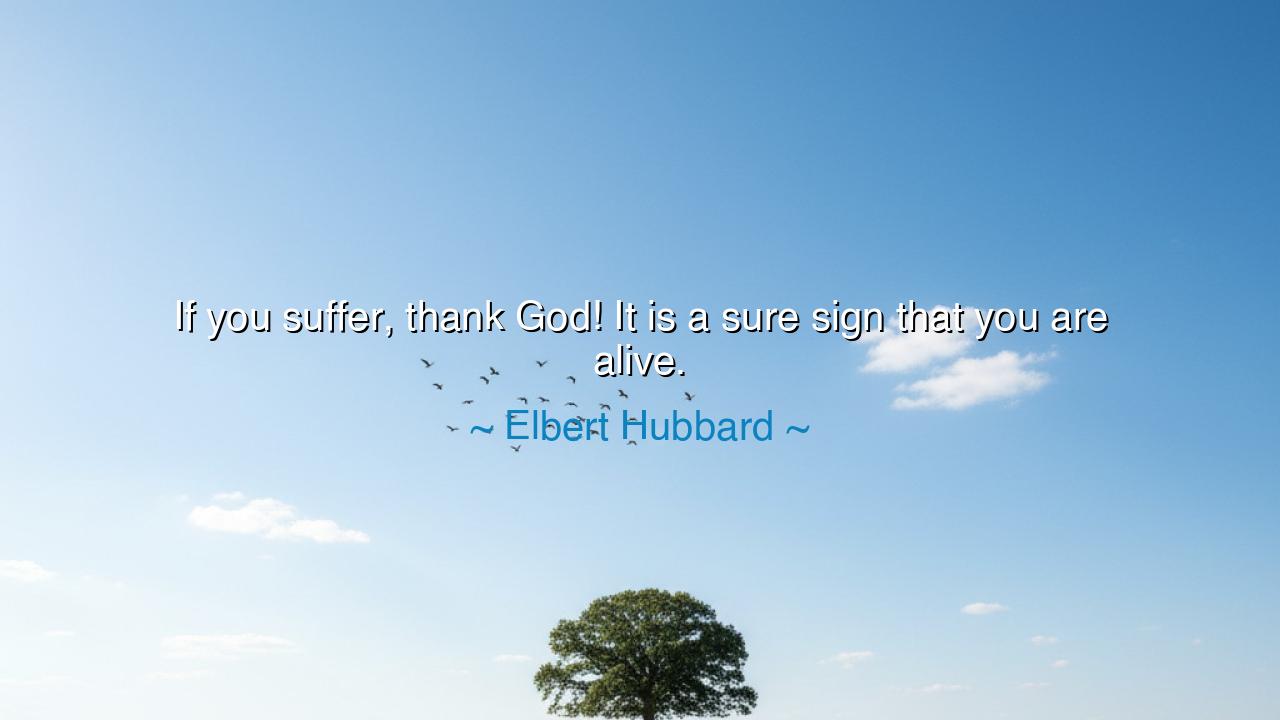
If you suffer, thank God! It is a sure sign that you are alive.






Elbert Hubbard, a craftsman of words and a prophet of practical wisdom, once proclaimed: “If you suffer, thank God! It is a sure sign that you are alive.” These words are not a glorification of pain, but a fierce declaration of life’s vitality. For to suffer is to feel, to engage with existence in its raw and untamed form. The numb stone does not suffer, nor the lifeless body. Only the living heart, beating in flesh and spirit, can feel the pangs of sorrow, of struggle, of loss. Thus, suffering itself becomes proof of being—evidence that the soul still walks its earthly journey.
To thank God in the midst of suffering is not an easy command; it is an act of courage. Gratitude in joy is natural, but gratitude in pain is transcendent. Hubbard reminds us that to be alive is a gift so immense that even suffering is better than nothingness. To feel agony is to affirm existence; it is to proclaim, “I am here, still standing, still breathing, still engaged with this mortal struggle.” Suffering becomes, paradoxically, a form of thanksgiving for the very breath of life.
The ancients too understood this truth. The Stoics taught that suffering was not an enemy, but a teacher that honed the soul. Epictetus, himself once a slave, declared that adversity revealed the strength within a man. The Christian apostle Paul wrote of rejoicing in tribulation, for it produced endurance, character, and hope. Across time, the wisest knew what Hubbard echoes: that suffering, though bitter, is the fire by which life reveals its true metal.
History offers us luminous witnesses. Consider Viktor Frankl, the Jewish psychiatrist imprisoned in Nazi concentration camps. In the crucible of unimaginable torment, he discovered that meaning could be found even in suffering, and that this meaning was itself a lifeline. Frankl did not thank God for cruelty, but for the fact that even in suffering, he was still alive, still capable of love, still capable of choice. His survival and his philosophy became a beacon to millions, embodying Hubbard’s cry that life—no matter how painful—is still a gift worthy of thanks.
There is a deep mystery here. For if suffering proves life, then those who have never suffered have never fully lived. The seed must break to grow, the metal must endure the forge to be strong, the heart must bleed to know its own depth. To live without pain is to live shallowly; to live with pain and to rise with gratitude is to live nobly. Suffering, when received with thanksgiving, transforms from curse into crown.
The lesson for us is clear: do not despise suffering, but interpret it as a sign of life. When pain visits you, do not ask first, “Why me?” but say instead, “I thank You, for this proves I am alive.” From that starting point, seek the wisdom within the suffering—what it teaches, what it strengthens, what it awakens. Gratitude will not erase pain, but it will sanctify it, and sanctified suffering becomes a source of strength rather than despair.
Practically, this means training the soul to see life itself as a miracle. Begin by giving thanks daily for breath, for the beating of your heart, for the senses that still feel—even when they feel pain. In moments of trial, whisper the ancient prayer: “I am alive, and therefore I give thanks.” In this way, you will rise above bitterness, and suffering will become a passage toward wisdom rather than a prison of despair.
Thus, Hubbard’s words stand as both thunder and comfort: if you suffer, thank God—it means you are alive. Let us not curse the fire, but honor it as the proof of life’s flame. For when suffering is embraced with gratitude, it becomes not our destroyer, but our teacher, shaping us into souls of endurance, humility, and strength.






AAdministratorAdministrator
Welcome, honored guests. Please leave a comment, we will respond soon